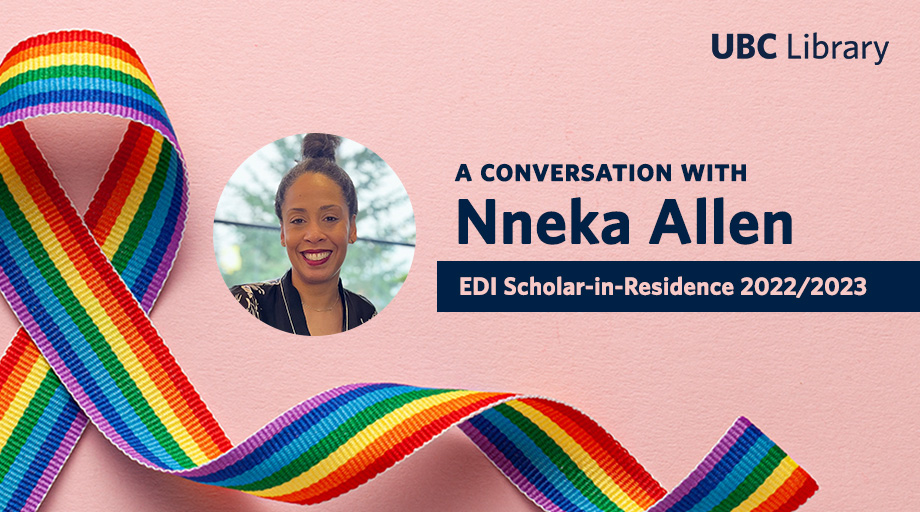
NNEKA ALLEN,
UBC Library EDI Scholar-in-Residence 2022/2023
Book a consultation session on March 15 with Nneka Allen.
Nneka Allen is a Black woman and a descendant of the Underground Railroad. Her African ancestors had a historic relationship with the First Peoples of Canada and as result, the Cherokee and the Ojibwe are also her relations. She is a 6th generation Canadian and a Momma. Nneka is also the principal and founder of The Empathy Agency. She helps organizations deliver more fairly on their mission and vision by coaching leaders and their teams to explore the impact identity has on organizational culture and equity goals. Read Nneka’s full bio.
Q: What have been your biggest professional challenges?
The biggest barrier to my professional career has, no doubt, been the force and power of white supremacy culture that demands assimilation. Frankly, the problem with assimilation is that you will never truly belong. Which leaves us to accept exclusion and racism while denying our identities—as a Black woman and a descendant of the Underground Railroad, raised by racially conscious Black parents, I’ve never been inclined to that. Living with the reality of white supremacy culture has been my primary challenge. I know that my story is not unique, which is the reason I do the work I’m doing now.
Q: What has been the highlight of the last couple years for you professionally?
So when I initially think about this question, I immediately think about one of the primary outcomes of the work that I’ve been doing over the last two years, which is The Racial Equity Blueprint. My former business partner and I created this [program] originally in a live virtual format, and last year we decided to move that program into an online asynchronous format. We launched that in January and have been running all three elements of The Racial Equity Blueprint in that format. Witnessing the difference in accessibility by moving it into this format is really interesting, and I think it’s given me exposure and access to new clients and new groups.
“Living with the reality of white supremacy culture has been my primary challenge.”
Second, is my work around the book, Collecting Courage: Joy, Pain, Freedom, Love which I co-authored and co-edited in 2020 with two other editors and 14 Black fundraisers from the United States and Canada. That book has meant a tremendous amount to me because it is the documenting and elevation of our stories as Black people. In 2022, the Editors of Collecting Courage proudly launched A Path to Action: Journey Towards Collecting Courage, which is an online asynchronous learning experience for individuals and groups.
Q: Why did you want to participate in the EDI Scholars-in-Residence program?
I said yes because it scared me. I made a commitment to myself when I started The Empathy Agency, to do things afraid. The fact that I feel fear is often an indication that I’m probably in the pocket, and I’m right at the intersection of my top two values, which are love and justice.
This is a tremendous opportunity for me to grow, to go deeper on subjects that pique my curiosity, to illuminate stories that I haven’t yet told, for the purpose of a collective learning and deeper knowing. I think this is an opportunity to share a Black woman’s view of the world, and I think that doesn’t happen frequently enough. And in the end, I said yes because my elders said, “You’re doing this.” Can’t argue with that. The only thing I could say to that was yes ma’am, yes sir.
Q: In your consultation sessions with UBC faculty, staff or students, what topics would you love to discuss or what questions would you love to get?
In an effort to not limit the conversation, one of my favourite questions to ask my clients and student learners—but also a question that I reflect on often—is how can everyone be powerful?
“I am ultimately on a journey of understanding how our oppressions are linked. I think that’s some of the most powerful work that we can do to understand each other’s humanity.”
This question begins to get at the heart of what justice and equity are about, which is balancing power. What needs to change in order for everyone to be powerful? When we begin to think about that, we begin exploring what belonging environments could look like. I’m always keen to talk about power, and power as it relates to race and the intersections of Blackness and womanhood. I am ultimately on a journey of understanding how our oppressions are linked. I think that’s some of the most powerful work that we can do to understand each other’s humanity.
Q: Are there any resources at the library that you’re hoping to access while you’re here?
There’s a caveat: I’m a book lover and a book buyer. I’m that person. Many people I know say, “I going to reserve that book at the library.” And I think, no, I have to own it. You see, I reference many of my books in my work. They are a continual resource in my growth and I need to be able to reach for books on my shelf. This question however challenged me to really think about the role of the library in this residency experience and then it occurred to me. I am super curious to know what Black history resources you have in your library. Is there a Black history collection? I would really be fascinated to spend some time looking at those resources.
The Equity, Diversity, and Inclusion (EDI) Scholars-in-Residence program is open to scholars who hold degrees in any discipline. Residency at UBC’s Irving K. Barber Learning Centre allows Scholars to participate in collaborative and interdisciplinary public programming with a clear impact on equity, diversity, and inclusion. For more information, visit the program website.